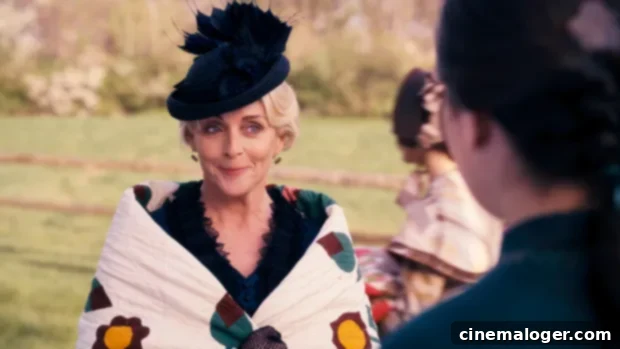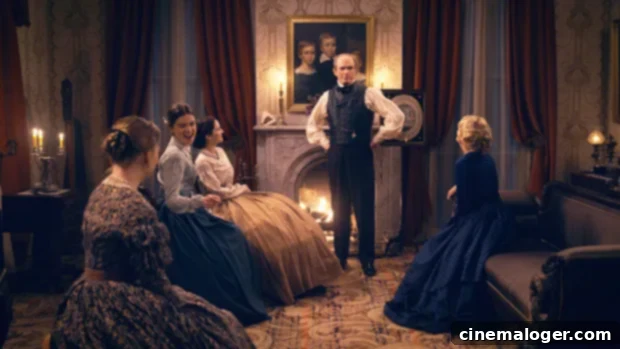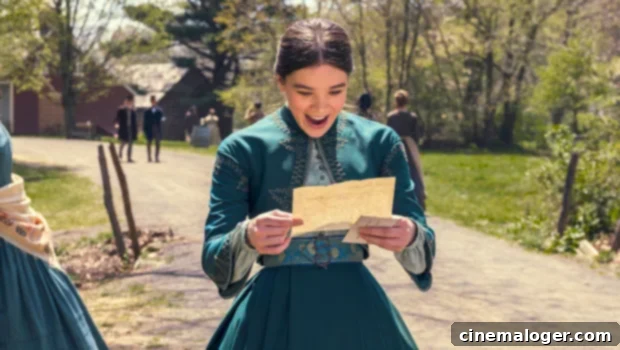Dickinson Season 3 Recap: Emily’s Heartfelt Attempt at Family Reunion Ignites Turmoil and Poetic Ambition
As the third and final season of Apple TV+’s critically acclaimed series, Dickinson, reaches its poignant midpoint, Emily Dickinson finds herself navigating a tumultuous period of personal growth, burgeoning ambition, and the ever-present shadow of the American Civil War. This pivotal episode sees Emily, portrayed with captivating depth by Hailee Steinfeld, confronting both her family’s fracturing dynamics and the intoxicating allure of professional recognition for her poetry. With a renewed sense of purpose, spurred by validation from a prominent literary figure, Emily embarks on a mission to mend the deep rifts within her household, an endeavor that paradoxically leads to further conflict and a devastating emotional blow.
The episode opens with Emily’s spirits buoyed by momentous news: a response from the esteemed author and abolitionist, Thomas Wentworth Higginson (Gabriel Ebert). After meticulously reviewing her submissions, Higginson’s verdict is nothing short of triumphant; he declares her work “wholly new and original” and expresses a profound desire to read more. This external validation ignites a fierce confidence in Emily, solidifying her belief that her poetry is not only alive but possesses the power to contribute meaningfully to a nation embroiled in war. This newfound conviction intertwines with a deep-seated desire to bring peace to her fractured family, leading her to recommit to a mission of domestic reunification – a task far more daunting than she anticipates.
The cracks in the Dickinson household are evident from the outset. At a lively town quilting bazaar, Emily discovers her younger sister, Vinnie, has adopted a vow of silence. This silent protest is Vinnie’s unconventional, albeit heartfelt, method of coping with the devastating news that all her former suitors have tragically perished in the ongoing Civil War. Meanwhile, her parents, Mr. and Mrs. Dickinson, are grappling with intense public disapproval. Mr. Dickinson’s well-intentioned, yet severely “tone deaf,” letter to the editor – a plea for sympathy for Confederates, written on behalf of his brother in Georgia who despises Confederate politics – has rendered him an outcast in the community. His neighbors perceive him as “out of step with the moment,” ostracizing him even on his own birthday, highlighting the profound societal divisions caused by the war and the often-unforeseen consequences of public discourse.

Witnessing her family’s collective despair, Emily conceives a plan to lift their spirits and bridge the growing chasm between them: a family sing-a-long at the Dickinson homestead. Her mother, sensing an opportunity to alleviate her husband’s gloom, readily agrees, but insists that the gathering must be complete, requiring the presence of both Austin and Sue. While Austin remains a challenge, convincing Sue proves surprisingly simple, especially after Emily unleashes a profound, heartfelt declaration of love that resonates deeply with Sue’s weary soul.
This particular EmiSue moment is destined to become one of the series’ most iconic. Emily discovers Sue at her home, visibly exhausted and emotionally drained from caring for her baby. Sue’s despondency is palpable, rendering her vulnerable, a state Emily recognizes and mirrors. With raw honesty, much like her confessional encounter with Walt Whitman in the previous episode, Emily kneels before Sue and professes her unyielding devotion. “I love you,” she whispers, her voice laden with conviction. “I love you more than anything, and anyone on Earth.” The scene crescendos with a powerful line previously teased in the season’s trailer: “I can’t live with you,” Emily insists, her words conveying a complex truth, “I can’t breathe without you and I can’t write without you.” This declaration transcends mere romantic love, hinting at the symbiotic relationship vital to Emily’s artistic and emotional existence, underscoring Sue’s role as her muse and confidante.
Emily’s heartfelt confession serves as a balm to Sue’s troubled spirit, effectively “saving” her, as Emily boldly refers to herself as Sue’s “wife” – a tender and revolutionary affirmation of their bond. Revitalized by Emily’s unwavering affection, Sue agrees to attend the sing-a-long, even offering to persuade Austin to join. However, Sue’s attempts to reconcile with her estranged husband prove futile, culminating in another bitter argument before she makes her way to the Dickinson house, highlighting the deep-seated marital discord that even Emily’s optimistic efforts cannot easily overcome.
Despite Austin’s continued absence, the sing-a-long initially unfolds as a heartwarming success. For a precious few hours, the Dickinson women and Edward shed their worries, filling the living room with song, dance, and laughter. A lightness permeates the air, a stark contrast to the heavy atmosphere that has long enveloped the family. Amidst the joyous din, Sue manages to steal a quiet moment with Emily, offering insightful notes on a poem Emily had shared with her, “Safe in their Alabaster Chambers.” Emily, momentarily caught in the intimacy of the exchange, almost reveals that this is the very poem she submitted to Higginson. She catches herself just in time, acutely aware that sharing such information would deeply wound Sue, who cherishes their unique poetic partnership and might interpret Emily’s external ventures as a form of betrayal.

As the good times roll on, Mrs. Dickinson and Edward fondly reminisce about the early days of their courtship. However, the nostalgic mood quickly sours as their memories drift to their wedding day. Mrs. Dickinson, with a poignant edge, makes several uncomfortable jokes about being a “child bride” and recounts how her marriage tore her away from her mother and sister. These remarks reveal a deeper current of regret and unresolved grief, particularly in the wake of Lavinia’s passing. She openly questions her life choices, tracing them back to her earliest memories, a sentiment echoed by the others who acknowledge the profound difficulties everyone has been enduring. This collective moment of vulnerability and shared hardship profoundly inspires Emily, sparking another creative impulse within her.
Then comes the moment devoted fans of Hailee Steinfeld, eagerly anticipating it since the very first episode, have been waiting for: Emily gracefully sits at the piano and sings. Her chosen piece is “Hard Times,” the somber yet resonant song penned in 1854 by Stephen Foster. With only the piano’s delicate accompaniment and Hailee’s pure, expressive voice at the helm, the song’s century-old lyrics acquire an unsettling relevance, speaking directly to the current era of war and personal strife. The performance is captivating, drawing everyone into its emotional depth. Just before she concludes, Austin unexpectedly appears, joining his sister in song. This tender, unexpected duet underscores the inherent musicality of Adrian Blake Enscoe and Ella Hunt, alongside Hailee Steinfeld, making a compelling case for their future collaborations on Hailee’s next musical album.
However, this fragile moment of familial harmony is fleeting, quickly shattering as the family succumbs once again to their ingrained animosities. Austin, now fueled by alcohol, makes a series of shocking announcements. He declares his intention to leave his father’s established law firm to forge his own path, specializing in a new and burgeoning field: divorce law. Without a moment’s hesitation, he further asserts his decision to leave Sue and seek full custody of their child, delivering a brutal emotional blow. Devastated, Sue flees the room, and Emily, witnessing her brother’s cruelty, finally reaches her breaking point. She unleashes a torrent of anger at Austin, berating him for his callous disregard for Sue’s feelings and his refusal to mend their fractured family. Austin, however, retaliates with a stinging reminder, accusing their father of initiating the cycle of familial pain, explicitly referencing a dark history where Edward used to beat Emily.
Blinded either by her fierce protectiveness of Sue or a deep-seated, perhaps unconscious, devotion to her father, Emily makes a definitive and devastating choice. She starkly tells Austin that she chooses Edward over him and orders him to leave the house. With the emotional debris of their argument still hanging in the air, Emily rushes upstairs to comfort Sue. Yet, Sue’s distress isn’t solely rooted in Austin’s pronouncements. While alone in Emily’s room, Sue has stumbled upon Higginson’s letter, and the realization that Emily has been sharing her most intimate poems – poems Sue believed were exclusively hers – with another man, crushes her spirit. Emily frantically attempts to explain her reasons for reaching out to Higginson, but Sue, feeling profoundly betrayed, storms out, slamming the door shut in Emily’s face. The temporary peace is shattered, and the Dickinson household descends back into an emotional war zone, perhaps more fiercely divided than before.
Meanwhile, the episode also offers a brief but significant update on Henry’s compelling storyline. We follow him as he continues to navigate his crucial role as a teacher to the black regiment of soldiers, a mission fraught with unique challenges and profound significance. During their inaugural lesson, Henry begins to truly connect with his new students, discovering their individual personalities and backstories. There’s Everett, a man with surprisingly refined taste in interior design; The Wall, a formidable figure known less for his physical stature and more for his unyielding strength of character; Aramis, who possesses a mysterious ability to foresee the future, full stop; and, quite astonishingly, Michael Jordan. Yes, you heard correctly. The sheer audacity and anachronistic humor of this name-drop provides a delightful moment of levity and sets the stage for many amusing follow-up jokes and reactions.
Despite the humorous interlude, Henry faces an uphill battle. While he makes some initial headway in convincing his eager students of the critical importance of literacy in their fight for freedom, these men are still primarily driven by an immediate desire to engage in combat. Henry reassures them that he and Higginson are working tirelessly to secure weapons for them, but cautions that it will be a “process.” In the interim, he passionately argues that the best way to face an uncertain future is to learn from the past, and that unequivocally means learning to read and write. For now, Henry manages to quell the rising impatience and restless energy of his students, bringing a temporary calm to the volatile waters, but the underlying tension for immediate action remains palpable.
This episode of Dickinson masterfully weaves together themes of artistic ambition, familial discord, societal pressure, and the personal toll of war. Emily’s journey continues to be one of profound self-discovery and the painful realization that pursuing one’s true calling can often come at a significant personal cost, especially to those held dearest. The ongoing conflicts within the Dickinson home and the broader American landscape promise an emotionally charged path forward as the series hurtles towards its conclusion.
‘Dickinson’ season 3 debuts all-new episodes every Friday, exclusively on AppleTV+.
